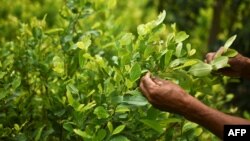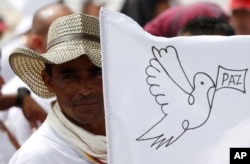A peace deal between Colombia and Marxist FARC rebels is being threatened by drug trafficking and cultivation of coca, the base ingredient for cocaine, a peace official said on Thursday, in the wake of a confrontation between coca farmers and police that killed seven.
"Drug trafficking and illegal crops are the most important threats," Rodrigo Rivera, the country's peace commissioner, told Reuters in his office inside the presidential palace.
"While that element exists, it's like honey attracting bees, they're circling and it's creating new organized crime in the territories where the FARC no longer are," Rivera said.
The government of President Juan Manuel Santos and the Revolutionary Armed Forces of Colombia (FARC) rebels signed a peace accord last year to end their roles in a conflict that has killed at least 220,000 people.
Thousands of FARC fighters have demobilized under the deal and the group is now a political party, but crop substitution is already a thorn in the side of the government.
Last week at least seven farmers protesting eradication were killed in a confused incident with police in Tumaco, in southwestern Colombia.
The defense ministry accused dissident former FARC members of stoking a confrontation and then firing on the crowd, while farmer's groups have accused jittery police of shooting to disperse the protest. An investigation into the incident is ongoing.
As well as dissidents from the rebel group, crime gangs have begun to take over coca areas, security sources say. The gangs often offer ex-combatants higher salaries than they are entitled to under the peace deal.
The dissidents and gangs can be a "siren's call" for ex-rebels, Rivera said.
Subsistence farmers have often been obliged by rebel groups, paramilitaries and crime gangs to plant coca. Some also choose to grow the crop because illegal groups will pay higher prices than farmers can earn with other products - a tempting possibility amid dire poverty.
Coca cultivation reached levels not seen for a decade last year after the government banned aerial fumigation with glyphosate, an herbicide that has been linked to cancer. The prohibition has sparked criticism from the United States, which is set to give the Andean country more than $400 million in funding help for the FARC deal.
Coca is cultivated on about 188,000 hectares (464,000 acres) across Colombia and cocaine production capacity is up to 700 tons annually. The government wants to eradicate 100,000 hectares this year.






